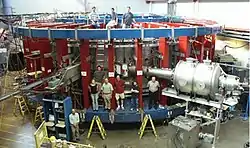The Enormous Toroidal Plasma Device (ETPD) is an experimental physics device housed at the Basic Plasma Science Facility at University of California, Los Angeles (UCLA). It previously operated as the Electric Tokamak (ET) between 1999 and 2006 and was noted for being the world's largest tokamak[1] before being decommissioned due to the lack of support and funding.[2] The machine was renamed to ETPD in 2009. At present, the machine is undergoing upgrades to be re-purposed into a general laboratory for experimental plasma physics research.
As the Electric Tokamak
 A top view of the Electric Tokamak. | |
| Device type | Tokamak |
|---|---|
| Location | Los Angeles, California, US |
| Affiliation | UCLA |
| Technical specifications | |
| Major radius | 5 m (16 ft) |
| Minor radius | 1 m (3 ft 3 in) |
| Plasma volume | 188 m3 |
| Magnetic field | 0.25 T (2,500 G) |
| Heating power | 2 MW |
| Plasma current | 30–45 kA |
| History | |
| Year(s) of operation | 1999–2006 |
The Electric Tokamak (ET) was the last of a series of small tokamak machines built in 1998 under the direction of principal investigator and designer, Robert Taylor, a UCLA professor. The machine was designed to be a low field (0.25 T) magnetic confinement fusion device with a large aspect ratio. It is composed of 16 vacuum chambers made of 1-inch thick steel, with a major radius of 5 meters and a minor radius of 1 meter. The ET was the largest tokamak ever built at its time, with a vacuum vessel slightly bigger than that of the Joint European Torus.
The first plasma was achieved in January 1999. The ET is capable of producing a plasma current of 45 kiloamperes and can produce a core electron plasma temperature of 300 eV.[3][4]
Four sets of independent coils are necessary for OH (ohmic heating) current drive, vertical equilibrium field, plasma elongation and plasma shaping (D or reverse-D). The OH system provides 10 V·s using a 10 kA power supply. Up to 0.1 T of vertical field can be applied for horizontal control and this is more than sufficient for all plasma configurations, including high beta. An additional set of coils provide a small horizontal field to correct for error field and to stabilize the plasma vertically. All the coils are located outside the vessel and are constructed out of aluminium.
A Rogowski probe outside the vessel and sets of Hall probes inside the vessel are used to monitor plasma current, position and shaping and are used in the control feedback loop. The poloidal system was designed using an in-house equilibrium code as well as a variety of other codes in order to cross-check computations and to assess the stability of the resulting plasma.
Like most tokamaks, the machine uses a combination of RF heating and neutral beam injection to drive and shape the plasma.
Decommission in 2006
In 2006, the ET had run out of funding and was decommissioned following the retirement of Taylor. Factors leading to loss of funding are attributed to the lack of extensive plasma diagnostics, its large size, and its place in the politics of fusion. When it was operating, the ET was funded mostly by the Department of Energy (DOE).[2]
As the Enormous Toroidal Plasma Device
In 2009, the Electric Tokamak (ET) was renamed to the Enormous Toroidal Plasma Device (ETPD) and was re-purposed for basic plasma research. A lanthanum hexaboride (LaB6) plasma source was developed for the ETPD[5] (similar to the one used in the Large Plasma Device), and is capable of producing a long column of magnetized plasma (~100 m) that winds itself multiple times along the toroidal axis of the machine. The plasma column was shown to be current-free and terminates on the neutral gas within the chamber without touching the machine walls.[6]
The typical operational parameters of the ETPD[7] are:
- Density: n ≤ 3 × 1013 cm−3
- Electron Temperature: 5 eV < Te < 30 eV
- Ion Temperature 1 eV < Ti < 16 eV
- Background field: B = 250 gauss (25 mT)
- Plasma beta: β ~ 1
The ETPD is currently in the process of being upgraded (i.e. larger sources,[8] better diagnostic capabilities) to support a wide range of plasma physics experiments.
See also
- Large Plasma Device, a linear plasma device housed in the same facility as the ETPD
References
- ↑ "2002-03_Annual Report" (PDF). Archived from the original (PDF) on 2016-03-03. Retrieved 2020-03-31.
- 1 2 Taylor, Robert John (2014). "UCLA Tokamak Program Close out Report". doi:10.2172/1117531. OSTI 1117531.
{{cite journal}}: Cite journal requires|journal=(help) - ↑ Initial Plasmas in the Electric Tokamak.
- ↑ Taylor, R. J.; Gauvreau, J.-L.; Gilmore, M.; Gourdain, P.-A.; LaFonteese, D. J.; Schmitz, L. W. (2002). "Initial plasma results from the Electric Tokamak". Nuclear Fusion. 42 (1): 46. Bibcode:2002NucFu..42...46T. doi:10.1088/0029-5515/42/1/307. ISSN 0029-5515. S2CID 250866429.
- ↑ Cooper, C. M.; Gekelman, W.; Pribyl, P.; Lucky, Z. (16 Aug 2010). "A new large area lanthanum hexaboride plasma source". Review of Scientific Instruments. 81 (8): 083503–083503–8. Bibcode:2010RScI...81h3503C. doi:10.1063/1.3471917. ISSN 0034-6748. PMID 20815604.
- ↑ Cooper, C. M.; Gekelman, W. (24 Jun 2013). "Termination of a Magnetized Plasma on a Neutral Gas: The End of the Plasma". Physical Review Letters. 110 (26): 265001. Bibcode:2013PhRvL.110z5001C. doi:10.1103/PhysRevLett.110.265001. PMID 23848883.
- ↑ DeRose, K. L.; Cooper, C.; Pribyl, P.; Gekelman, W. (2008). "Measurement of the Plasma Beta in the Enormous Toroidal Plasma Device (ETPD)" (PDF). Archived from the original (PDF) on 27 July 2018. Retrieved 26 Jul 2008.
- ↑ Carter, T. A.; Dorfman, S.; Vincena, S.; Gekelman, W.; Klein, K.; Howes, G. G. "High beta, hot ion, magnetized laboratory plasmas in LAPD and ETPD: prospects for studying processes relevant to space and astrophysical plasmas". CiteSeerX 10.1.1.709.6176.
{{cite journal}}: Cite journal requires|journal=(help)
